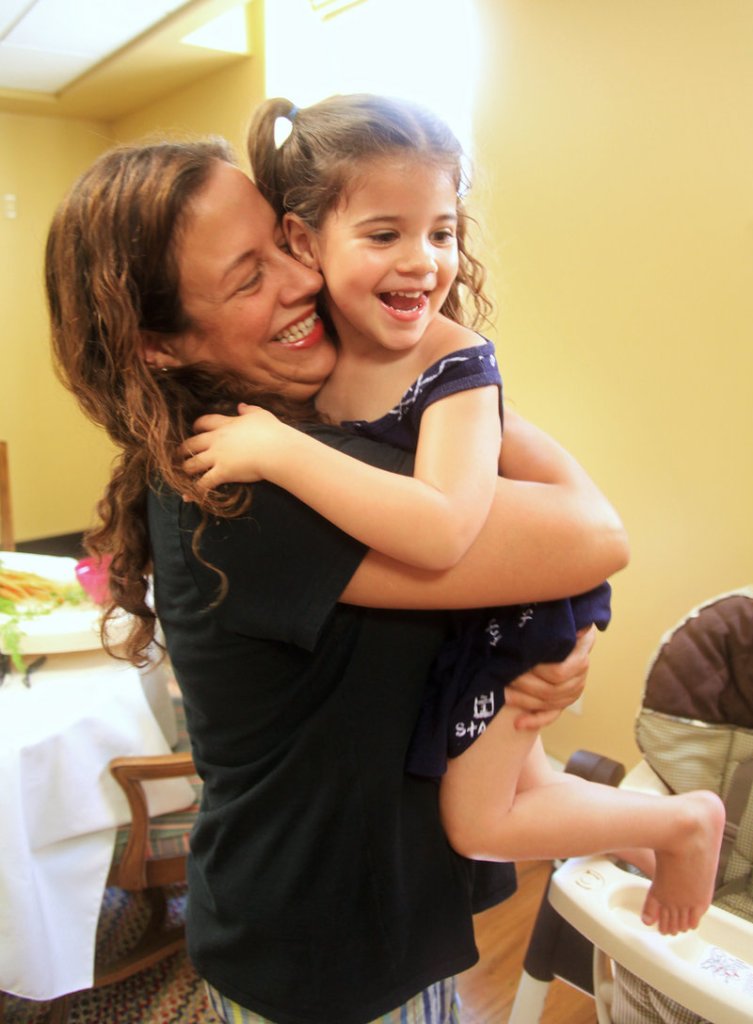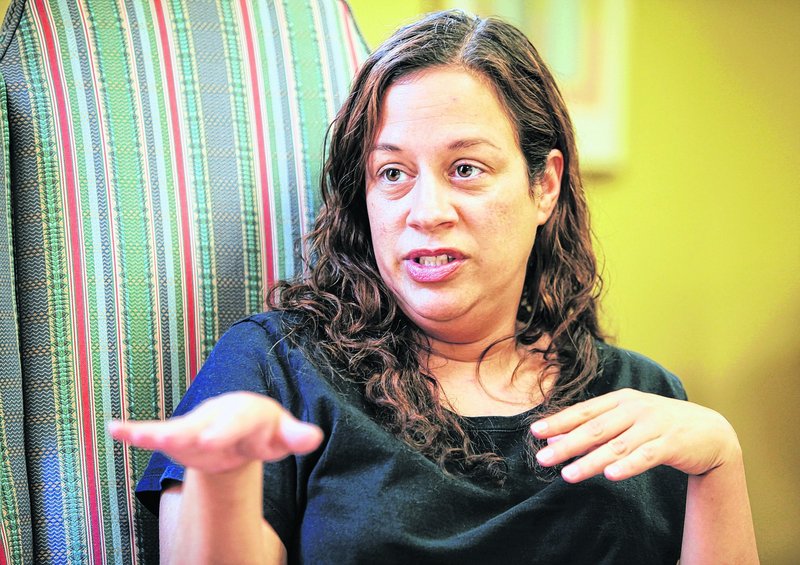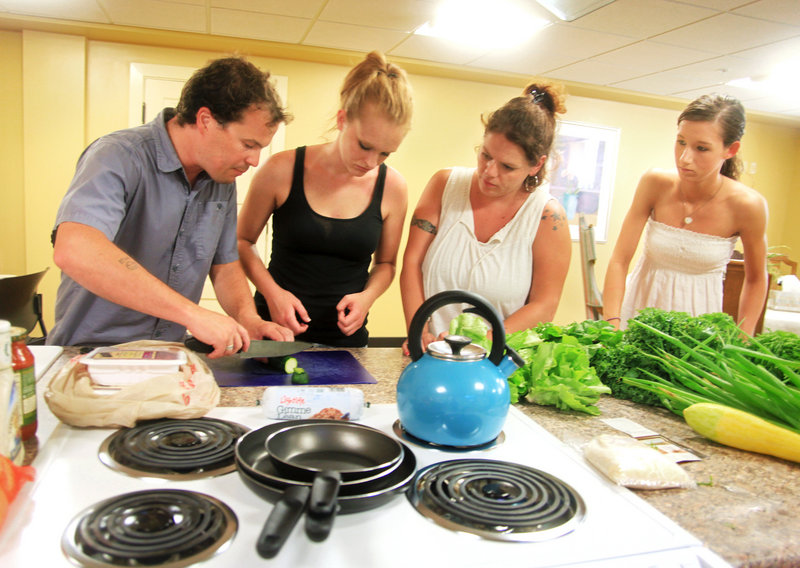PORTLAND — Shelly Fasano said when she was addicted to alcohol and prescription pills, she didn’t know how to be a good parent to her daughter, Gina.
“I never really looked into her eyes,” Fasano said quietly. “At least not the kind of eye contact a parent should have, where you’re truly focused on your child.”
Fasano is one of 15 women in a recently expanded treatment program offered by Mercy Health System that allows children of substance abusers to live with their moms while the women undergo treatment.
Fasano said she failed previous 28-day substance abuse programs, in part because she was separated from Gina, now 3.
“It was harder to concentrate on the treatment because my daughter wasn’t with me,” Fasano said, explaining that she felt a void in her heart when her child was absent. “It was just torturous.”
Fasano, 39, of Portland, is now in the last months of a two-year treatment program at Mercy Hospital’s McAuley Residence, a rare live-in substance abuse program designed specifically for women in which the women’s children live with them.
Fasano said the program has helped her learn not only how to beat her addictions, but also how to be a good parent.
“When I wasn’t right, I used to put her in front of the TV a lot, or sit her in her high chair, or put her in her playpen,” Fasano said. “Now I sit her on my lap and read to her.”
One day last week, Gina, who shares her mother’s complexion and long brown hair, wanted to watch a cooking class at the McAuley Residence — a former children’s hospital located on High Street in Portland. She beckoned for her mother to join her, and the two held hands as they watched cooking instructors cut up garlic and carrots.
Melissa Skahan, a vice president at Mercy Hospital who oversees the McAuley Residence, said the program has doubled in size, moving in January from State Street to its new location on High Street. But even though the program now can treat 15 women at one time, one or two potential clients per week still have to be turned away.
“The need is profound,” Skahan said. She believes the program is the only substance abuse treatment program in the state that allows children to live with their mothers while the moms are in treatment.
The program will likely be expanded, Skahan said, when Mercy Health System and Eastern Maine Healthcare Systems in Bangor complete their merger this fall. She said they’re looking at a location in Brewer to replicate the program in eastern Maine.
Skahan said that 80 percent of the women who complete the McAuley Residence program are employed and have a stable residence, according to internal statistics compiled by the hospital. Fifty-eight percent end up with a more advanced educational degree than they had before they entered the program, Skahan said.
Research has shown that substance abuse programs tailored to women are more effective for them than mixed-gender programs, according to a 2003 report for the U.S. Substance Abuse and Mental Health Services Administration.
The report also found that women who lived with their children while in treatment stayed in the programs longer, had higher self-esteem and lower levels of depression than women who were separated from their children.
Jeana Coggins, 29, who has been at the McAuley Residence for about six months, said that her 6-year-old daughter is a motivating factor for her to complete the program. Her child’s presence every day is a constant reminder.
“We have a much closer bond now. She notices and feels the change in me,” Coggins said. “I was scared when I first showed up here. I didn’t want to grow up. Everything was someone else’s fault.”
Coggins said sometimes she has to explain to her daughter that she needs to go to meetings so that “Mommy can be a better mommy.”
Maddie Wilson, 21, gave birth to her son 14 months ago, about a month after she showed up at the McAuley Residence. She said she grew up in an unstable household in Chicago, dropped out of school in the 10th grade and fell into substance abuse.
“I didn’t know how to take care of myself, so how could I take care of a child?” Wilson said. “I had nothing, and I was going nowhere. I’m not sure what would have happened if I hadn’t come here. I don’t like to think about it.”
Wilson has since earned her GED, and she plans to attend Southern Maine Community College for a career in radiology or as an elementary school teacher.
The McAuley Residence program offers more than addiction treatment, as the women can take classes in parenting, personal finance, job skills, and even in quilting and yoga. They also learn simple things, such as having a dinner in which everyone sits at the table together.
“Many of them have never sat down and had a real dinner together,” said Laura Phillips, program manager at the McAuley Residence.
Phillips said the women are given a significant measure of independence. They pay rent to the Community Housing Authority of Maine. Many hold down part-time jobs or go to school, and while they have to meet certain milestones during their stay, they are free to do some activities, such as going to the store unsupervised.
Despite the fact that their freedom means the women could buy drugs on the street while unsupervised, program organizers said that hasn’t been a problem.
“I am not going to hold their hand, because in the real world they are not going to have their hands held for everything,” Phillips said.
The program’s philosophy of fostering independence also makes it less expensive to run, Skahan said. Operational costs are about $180,000 per year, she said, with the costs contained by not employing a 24-hour staff and not directly providing many services. For instance, the women choose their own outside counselors, who meet with them at the McAuley Residence. In many cases, the women’s insurance pays for their addiction counseling.
Phillips said that set-up is often better than having counselors within the program, because the women can keep the same counselors after they’ve left McAuley Residence.
Fasano said attending highly structured 28-day programs was not as helpful as being treated like an adult at McAuley.
“It’s easy to do well when you’re in the program and people are helping you all the time, but it doesn’t really prepare you for when you get out,” she said.
Fasano, a college graduate, currently works 20 hours per week as an executive assistant, and plans to further her career when she leaves in a few months, perhaps going back to school.
“Things are going to be all right,” she said, smiling.
Joe Lawlor can be reached at 791-6376 or at:
jlawlor@pressherald.com
Twitter: @joelawlorph
Send questions/comments to the editors.






Success. Please wait for the page to reload. If the page does not reload within 5 seconds, please refresh the page.
Enter your email and password to access comments.
Hi, to comment on stories you must . This profile is in addition to your subscription and website login.
Already have a commenting profile? .
Invalid username/password.
Please check your email to confirm and complete your registration.
Only subscribers are eligible to post comments. Please subscribe or login first for digital access. Here’s why.
Use the form below to reset your password. When you've submitted your account email, we will send an email with a reset code.